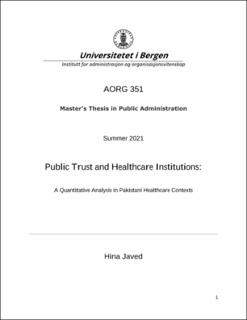Public Trust and Healthcare Institutions: A Quantitative Analysis in Pakistani Healthcare Contexts
Master thesis
Permanent lenke
https://hdl.handle.net/11250/2771275Utgivelsesdato
2021-08-02Metadata
Vis full innførselSamlinger
- Master theses [83]
Sammendrag
This paper presents a case for generalizing Seok-Eun Kim’s model of public trust to healthcare institutions. The model consists of five variables that together conceptualize trustworthiness: credible commitment, benevolence, honesty, competency, and fairness. Respondents were asked to answer questions that captured these variables with regards to two hospitals in Karachi, Pakistan: Jinnah Postgraduate Medical College and Aga Khan University Hospital. The sample consisted of 41 people and was collected through snowball sampling, which compromises its randomness. Seven hypotheses were tested. The first five consisted of seeing if Kim’s variables are related to institutional trustworthiness. Of these five, the first and third null hypotheses were rejected, with the variables (credible commitment and competency) having a positive correlation with institutional trustworthiness. Benevolence, honesty, and fairness were not significantly related to institutional trustworthiness. The sixth hypothesis claimed that an average of Kim’s variables would be positively related to measures of institutional quality (which are typically taken to be predictors of institutional trust in the literature). This null hypothesis was rejected, and there was a positive relation between the two variables (however, this was primarily due to treatment quality, as this was the only statistically significant measure of institutional quality). Lastly, there was a statistically significant, positive correlation between the average of Kim’s variables (an operationalization of institutional trust) and interpersonal trust, which provides support for the theoretical mechanism being put forward, which claims, inter alia, that interpersonal and institutional trust reinforce each other in a feedback loop.
